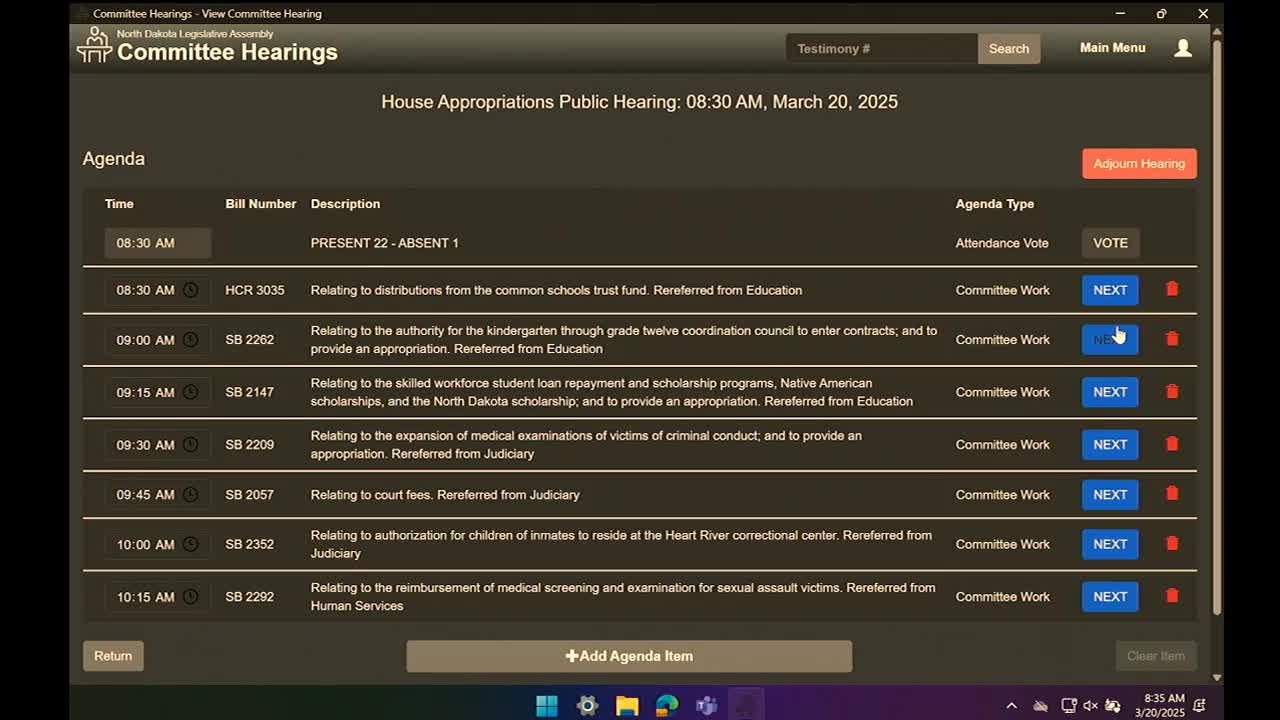Appropriations committee weighs constitutional measure to divert up to $3 billion from trust funds for school construction
Get AI-powered insights, summaries, and transcripts
Subscribe
Summary
Lawmakers debated House Concurrent Resolution 3,035, which would send a constitutional measure to voters to authorize up to $300 million a year for 10 years from perpetual trust funds to a school construction program; committee rejected a sponsor amendment and voted to recommend ‘do not pass.’
House Appropriations Committee members debated House Concurrent Resolution 3,035 on the measure’s plan to send a constitutional amendment to voters allowing up to $300 million per year for 10 years (a cumulative $3 billion) to be withdrawn from perpetual trust funds for a school construction program.
The resolution’s sponsor, Representative Pat Heinert, told the committee the measure would redirect $300 million per year for 10 years from perpetual trust funds established under Article IX of the North Dakota Constitution into a school construction program, and that committee modeling projects long-term reductions in distributions and trust balances. “This is a resolution to put on the vote of the people a constitutional measure to utilize $300,000,000 per year for 10 years totaling $3,000,000,000 from the perpetual trust funds established under Article 9 of the Constitution for School Construction Program,” Heinert said during his presentation.
Why it matters: supporters said the money would provide capital funding for school construction needs that some districts cannot meet locally; opponents and a fiscal witness said the withdrawals would materially reduce future distributions from the Common Schools Trust Fund and related perpetual funds, potentially lowering the long-term funding available for K–12 state aid.
Land Commissioner Joseph Herringer testified in opposition and described modeling the Land Board provided to the committee. Using the board’s 6.72% assumed rate of return, Herringer said the projected cumulative reduction in distributions from the Common Schools Trust Fund would be roughly $4.4 billion over 30 years and that the fund balance could be reduced by roughly $5.8 billion, which he characterized as a long-term negative impact. “I do believe there are some major issues with this bill. I have some major concerns,” Herringer said, summarizing the Land Board’s analysis.
Committee members pressed the sponsor on details the resolution does not contain. Representative Bosch asked how recipients would be chosen; Heinert and others acknowledged the resolution does not include implementation mechanics and that no allocation or qualification process currently is in law. Representative Richter asked whether the program would be grants or loans; Heinert initially misstated loan but corrected himself, saying the measure contemplates grants. Multiple members noted the resolution does not create a baseline assessment of school needs or a distribution formula, and several said the absence of mechanics makes it difficult to determine who would benefit.
Several legislators expressed concern about the constitutional and policy implications of diverting funds intended to benefit all public schools. Representative Nelson pointed to language in the resolution that says state aid payments may not be reduced “as a result of this subsection,” but warned that, in practice, if trust distributions decline, the general fund could be required to backfill school aid. Representative Nathie and others said opening the trust to principal withdrawals would set a precedent that could be difficult to reverse.
Representative Murphy offered Amendment 25.3103.01001, which narrowed some language and clarified that distributions would originate from the Common Schools Trust Fund rather than all perpetual trusts and set an up-to-$600 million per biennium ceiling. The committee voted on the amendment; the amendment failed on the floor roll (tally reported later as 7 yeas, 16 nays). After further debate, the committee voted on a motion of "do not pass" for HCR 3,035. The committee’s recorded action was a do-not-pass recommendation, which carried on a roll call reported as 22 to 1.
What the committee did not decide: the resolution leaves open who would qualify for funds, how funds would be prioritized among districts, and whether districts that recently completed projects using bonds could seek grants. The sponsor and witnesses repeatedly said the legislative assembly would need follow-up legislation to create distribution mechanics if voters approve the constitutional change.
Ending: With division among members and a detailed fiscal warning from the Land Commissioner, the Appropriations Committee recommended a do-not-pass on HCR 3,035. Sponsors and opponents said the issue would likely return if the legislature or voters pursue school construction funding again; members urged any future measure to include distribution mechanics and baseline assessments of school needs.
